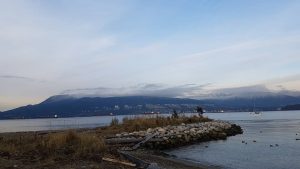Thoughts on Education, Technology, and Teacher Education in 2017
This winter break I had a lot of time to think about the future of education and the role technology will play in it. I was able to reflect on the role technology plays in my own professional and personal life.
As I was walking along the beautiful Spanish Banks in Vancouver and taking photos with my smartphone, I was thinking how technology has changed my life and the lives of my students (future science teachers). However, while walking along, I decided not to get distracted by Facebook, Instagram, Skype and other social media tools that were installed on my phone. I wanted to walk, to think, to imagine and probably to take a few photos to share with my friends later on… This made me think about how technology has shaped our lives not only in terms of the unprecedented access to information, but also in terms of blurring of the lines between information and knowledge.
The unprecedented access to information is very deceiving. Having access to some information online or offline (yes, when I was growing up the information “was stored” in books) doesn’t mean you will have the time or the ability to process this information and turn it into your own knowledge. Thus a lot of information that is available to us (real or false) – is just that – information that will never turn into our own knowledge… This reminded me of the Great Soviet Encyclopedia (50+ very big and heavy volumes) that we had in my parents’ house many years ago. I grew up seeing the big black volumes of the encyclopedia in front of my eyes. Even though it was printed in black and white (I think some inserts might have had colour), it included a lot of very interesting information on a wide vareity of topics. At the same time, the Encyclopedia was extremely biased – as one of its goals was to continue brainwashing the population. In addition, it was not easy to use (comparing with what we can do now with searching and cross-linking). However, it gave you a sense of enormous amount of information checked by experts (at least in the field of natural sciences we could most of the time trust these experts), which was at the same time a limited amount. It was also important that you realized that reading one encyclopedia article might take a long time and you will need it to process this information and make it your own knowledge (think of Piaget’s accommodation and assimilation).

Great (Big) Soviet Encyclopedia
Comparing to what we face today, it was incredibly different. Today technology gives us a false impression, that we have control over the world, that we know so much more than our predecessors because we can google it up, as if education and finding something online have become the same thing. I am confident that they are not. It takes time and effort to process information, to challenge your own ideas and to be skeptical about the ideas somebody has presented to you. It is not easy and it is not fast. Think about how often you hear people on the climate change debate who have no understanding of any science behind it. They took sides based on their political affiliation or to match the views of the people who surround them. However, they have no deep understanding of the issue, because they have never taken the time to understand it… I think taking the time to understand is something we all need to work on.
As today is the second day of 2017 and we all think about what we will try to do better this year compared to the previous ones, I will try to focus this year on slow reading and slow thinking. In one of my research papers I recently published, I wrote about Deliberate Pedagogical Thinking with Technology – thinking with the purpose, thinking that is slow and painful, but the one that helps us build a deeper and more meaningful understanding of the world around us. I hope to slow down in 2017 and to force myself to think deeper and more deliberately about the issues I care about – teacher education, the use of technology in STEM (science, technology, engineering and mathematics) teacher education, teacher professional development, and teaching practice. I hope slowing down will help me. After all, there is a beautiful Russian proverb – One who moves slower gets farther (in English: Slow and steady wins the race). In my view, in Russian it sounds better because it is not about winning the race, but it is about advancing, moving on and pushing your own limits and boundaries.
I would like to wish all of us a great year of 2017! May we all push our boundaries and challenge our own limits this year and use technology to improve the quality of our life and make it more meaningful, exciting and fulfilling. Happy New Year!
